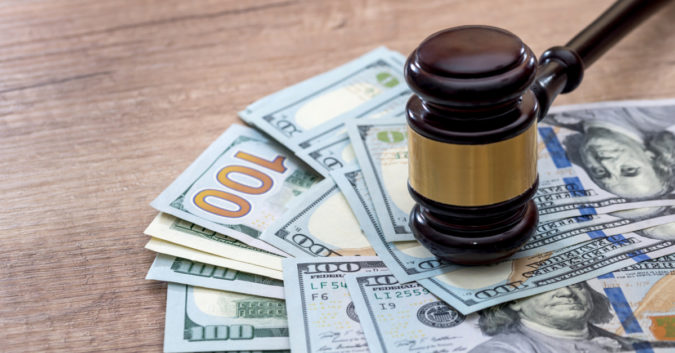A Florida woman claimed that her mesothelioma was the result of using Johnson & Johnson’s talc products that were tainted with asbestos. The company denied wrongdoing and went to trial.
On Feb. 27, the jury awarded the 82-year-old mesothelioma survivor $9 Million dollars after determining that J&J knew its talc products were defective and hid the information from consumers.
Nationwide, more than 18,000 people have come forward with claims that J&J products with tainted talc have caused them to develop mesothelioma or ovarian cancer. Bloomberg Intelligence, the research arm of the media conglomerate, estimated J&J’s talc litigation could cost the company up to $10 Billion.
J&J Continues to Claim Talc Is Safe Despite Losses and Settlements
The jury’s multimillion-dollar asbestos verdict marks the first talcum powder lawsuit that J&J has lost in the state of Florida, though they have lost several similar talc cases nationwide. The company has promised to appeal and continues to fight back against assertions that its talc is dangerous in any way.
However, two days before the Florida verdict, J&J settled a talc lawsuit with another mesothelioma survivor in a state court in New York, NY. The terms of the settlement were not made public, but according to court filings, the plaintiff claimed her mesothelioma was caused by her use of J&J’s talc products.
Regardless of the settlement, J&J still maintains that its talc products are safe. The company told Bloomberg that the decision to settle in the New York case does not reflect a change in strategy, nor is the company considering a wider settlement program.
Sticking to this story — that their talc products are 100% safe and free of asbestos — is a lot harder after the Food and Drug Administration (FDA) detected asbestos in a bottle of Johnsons’ Baby Powder® in 2019. J&J immediately disputed the positive tests, but the FDA has held firm to its conclusions.
The powder is the most famous of J&J’s talc products, and a key pillar of its brand image as a “caring” corporation. An image, it seems, that is in now serious jeopardy.
In early February, a jury in New Brunswick, New Jersey, home of J&J’s corporate headquarters, hit the company with a stunning $750 Million in punitive damages. This was later reduced by the judge according to state laws that cap punitive damages, but the jury’s message was clear: J&J knew that their talc was tainted by asbestos, and they failed to warn consumers.
Making Sense of the Talc Asbestos Controversy
Is talc safe?
It seems like the question should have been answered already, considering Johnsons’ Baby Powder has been on the market for 135 years.
On one side are those like J&J who claim that they can ensure that their cosmetic talc is safe. Talc and asbestos occur together in the same rock formations, but the company says its mining and purification processes keep their products free of the deadly carcinogen.
On the other side are sick plaintiffs, concerned consumers, and organizations like the Environmental Working Group (EWG) that allege talc is routinely contaminated by asbestos. They say that there is no way to make sure that there is no asbestos in talc, and they have the evidence to back it up.
“EWG and others have repeatedly found asbestos in products made with talc, including cosmetics marketed to children,” EWG Legislative Director Colin O’Neil said in a statement accompanying a petition urging federal regulators to require stricter asbestos testing for talc.
O’Neil and other public health advocates have said that lax testing standards are the reason that J&J can claim there is no asbestos in their talc products. The FDA standards for talc were set nearly 50 years ago and do not use the most accurate methods. Given the deadly risks of asbestos, O’Neil argued:
“It’s outrageous that a precise method for testing personal care products for the presence of asbestos exists but the cosmetics industry isn’t required to use it.”
Cosmetic talc products are used on some of the most sensitive areas of the body, often every day, which further increases the chance of exposure. Many people who have come forward against J&J have said that they used Johnsons’ Baby Powder daily, sometimes multiple times per day. After all, that is what J&J’s marketing materials told consumers to do.
The labeling never said J&J’s “daily-use” product might contain a known cancer-causing substance. Had consumers been warned, they might have opted for a cornstarch-based Baby Powder, which carries no such risk.
But consumers were never given that option.
J&J Will Say Whatever It Needs to Avoid Responsibility
The public tale that J&J likes to spin about asbestos in talc is that their products have always been safe. Internally, however, the company debated for years about what to do because they had, in fact, discovered asbestos in their talc mines more than once. They never shared these findings with regulators, and when people started getting hurt, J&J started telling lies.
As more and more damning evidence comes out, it should be expected that J&J will continue to mislead the public. Unless J&J starts to change its behavior, more people are going to be harmed, more people are going to file talc lawsuits, and the latest multi-million-dollar talc verdict against J&J won’t be the last.
